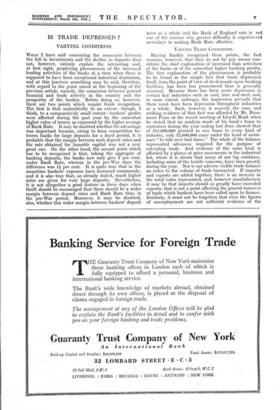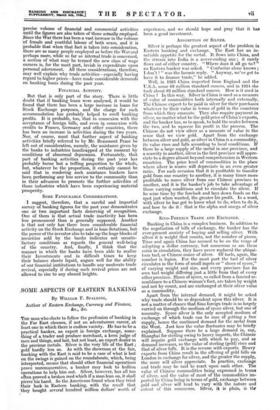IS TRADE DEPRESSED
VARYING CONDITIONS WHAT I have said concerning the connexion between the fall in investments and the decline in deposits does not, however, entirely explain the interesting and, at first sight, perplexing phenomenon of the increased lending activities of the banks at a time when there is supposed to have been exceptional industrial depression, and at this juncture something may be said, therefore, with regard to the point raised at the beginning of the previous article, namely, the connexion between general financial and trade activity in the country and the prosperity of the banker. Before doing so, however, there are two points which require frank recognition. The first is that undoubtedly to an extent—though, I think, to a comparatively small extent—bankers' profits were affected during the past year by the somewhat higher value of money as expressed by the higher average ,of Bank"Rate. It may be doubted whether the advantage was important because, owing to keen competition be- tween banks for large deposits for a fixed period, it is probable that the margin between such deposit rates and the rate obtained for loanable capital was not a very great one. On the other hand, the second point which has to be recognized is that, taking the aggregate of banking deposits, the banks now only give 2 per cent. under Bank Rate, whereas in the pre-War days the difference was 1 per cent. It is quite true that in the meantime bankers' expenses have increased enormously, and it is also true that, as already stated, much higher rates are given for very large deposits. Nevertheless, it is not altogether a good feature in these days when thrift should be encouraged that there should be a wider margin between deposit rates and Bank Rate than in the pre-War period. Moreover, it may be doubted, also, whether this wider margin between bankers' deposit rates as a whole and the Bank of England rate is not one of the reasons why greater difficulty is experien ced nowadays in making Bank Rate effective.
VARYING TRADE CONDITIONS.
Having frankly recognized these points, the fact remains, however, that they do not by any means con- stitute the chief explanation of increased loan activities of the banks or of the somewhat higher banking profits. The first explanation of the phenomenon is probably to be found in the simple fact that trade depression itself, from the point of view of its demands upon banking facilities, has been less pronounced than is generally assumed. Because there has been acute depression in certain key industries such as coal, iron and steel, and, to some extent, railways, the impression prevails that there must have been depression throughout industries as a whole. Such, however, is scarcely the case, and striking evidence of that fact was afforded by Mr. Beau- mont Pease at the recent meeting of Lloyds Bank when he stated that an analysis made of his bank's loans to customers during the year ending last June showed that of £44,000,000 granted in new loans to every kind of industry, only £2,800,000 came under the head of assist- ance " to tide over bad times." The whole of the balance represented advances required for the purpose of extending trade. And evidence of the same kind is afforded by a glance at price movements in the industrial list, where it is shown that many of our big combines, including some of the textile concerns, have risen greatly during the year. Nor is our adverse visible trade balance an index to the volume of trade transacted. If imports and exports are added together, there is an increase in the total value represented, and, however unsatisfactory it may be that imports should so greatly have exceeded exports, that is not a point affecting the general turnover of trade which bankers have been called upon to finance. Similarly, it must not be forgotten that even the figures of unemployment are not sufficient evidence of the precise volume of financial and commercial activities .until the figures are also taken of those actually employed. Since the War there has been a vast increase in the volume of female and youthful labour of both sexes, and it is 'probable that when that fact is taken into consideration, ,there are as many people employed as before the War and perhaps more, while so far as internal trade is concerned, a section of what may be termed the new class of wage earners is, for the most part, lavish in expenditure upon personal adornment. All these considerations, therefore, may well explain why trade activities—especially having regard to higher prices—have made considerable demands on banking loans during the past year.
FINANCIAL ACTIVITY.
But that is only part of the story. There is little doubt that if banking loans were analysed, it would be found that there has been a large increase in loans for Stock Exchange purposes, and the charge for such accommodation has probably helped to swell banking profits. It is probable, too, that in connexion with the acceptance of foreign bills, and even in connexion with credits to France, Germany and other countries, there has been an increase in activities during the two years. ,Nor, of course, must that further aspect of banking activities briefly referred to by Mr. Beaumont Pease be left out of consideration, namely, the assistance given by the banks to industries handicapped at the moment by conditions of abnormal depression. Fortunately, that part of banking activities during the past year has probably borne but a trifling proportion to the whole, but, whatever be the proportion, it certainly cannot be said that in rendering such assistance bankers have been performing any less service to the community than in their advances to promote the further activities of those industries which have been experiencing material prosperity.
SOME FAVOURABLE CONSIDERATIONS.
I suggest, therefore, that a careful and impartial survey of banking figures for the past year demonstrates one or two important facts deserving of recognition. One of them is that actual trade inactivity has been less pronounced than is generally supposed. Another is that not only has there been considerable financial activity on the Stock Exchange and in loan flotations, but the power of the investor also to take up the huge blocks of `securities sold by the banks indicates not unsatis- 'factory conditions as regards the general well-being of the country. And, finally, I think that the manner in which the banks have been able to realize their Investments and in difficult times to keep their balance sheets liquid, augurs well for the ability of our financial institutions to handle any moderate trade revival, especially if during such revival prices are not allowed to rise to any absurd heights.







































































 Previous page
Previous page